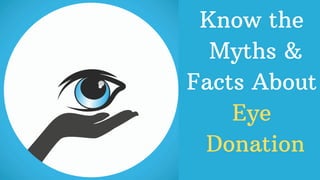Know the Myths & Facts About Eye Donation
- 1. Know the Myths & Facts About Eye Donation
- 2. Eye donation is an act of charity and entirely done for the benefit of the society. This is done after death. Only corneal blinds can be benefited through the eye donation not the other blinds. This should be encouraged in a large scale. Go through this presentation and get some important information on myths those are related to "Eye Donation".
- 3. Doctors will make little efforts to save my life if they are aware I am a registered organ donor.
- 4. It’s the duty of doctors, nurses and other health experts involved to save your life. The role of transplant surgeons comes into the scene after all the efforts to save a life has been exhausted.
- 5. Eye donation will leave holes in the eye socket causing face disfigurement
- 6. Eye donation does not cause any disfigurement of the face. Only the cornea of the eye is removed and not the entire eye. Thus, this should not interfere with any customary funeral plans, including those with open-casket viewings. The dignity and respect for the donor is maintained at all times.
- 7. I wear spectacles, I cannot donate eyes.
- 8. You can donate your eyes even if you have poor eyesight. Cataract, poor eyesight, and age do not hinder eye donation.
- 9. My eyes will be sold to rich patients.
- 10. Eye donation is an act of charity and it is illegal to buy and sell human eyes, organs, and tissues.
- 11. If I am in a state of comatose, my eyes will be harvested.
- 12. Being comatose and being brain dead are two entirely different things. Patients in a state of comatose are alive and will not be considered for organ donation at all. A person can come out of a state of comatose but declared brain dead it is nearly impossible to for a person come alive.
- 13. I am under age 18. I am too young to make a decision on eye donation.
- 14. Legally, yes but your parents or legal guardians can authorise this decision. You can express to your family you wish to donate. There are thousands of children who are in need of organ transplants and they need smaller organs than those an adult can provide.
- 15. My family will be asked to pay for the procedure of retrieving the corneas.
- 16. The family of the donor doesn’t have to bear any expense of organ and tissue donation. The family, however, has to take care of the funeral expenses on its own.
- 17. The retrieval of the corneas is a long procedure and will delay the funeral procedure.
- 18. The whole procedure doesn’t take more than 15 to 20 minutes.
- 19. There’s no need to inform my family about eye donation and I can mention about it in my will.
- 20. If you’re not a registered eye donor, your family’s consent is required. By the time your ‘will’ will be read and executed, it will be too late for you to be a donor. It’s best to pledge your eyes and inform your family about your wish to be a donor.
- 21. After pledging my eyes, I can not go back to being a non- donor.
- 22. The reality is that you can change your mind anytime you want. By informing the registry you can withdraw your registration. You can inform your family about your decision and tear up the donor registration card.
- 23. Procedure to Become an Eye Donor? Now, you are armed with facts and information. Present your eyesight to others and make your eyes immortal. Get more information here http://www.dishaeye.org/donate-your-eyes
- 24. Contact Details Address: 88 (63A), Ghoshpara Road, Kolkata- 700120. West Bengal, India. Phone No: (033) 2545-1233/1235/ 1236/ 1237/ 1238; 2593-1729/3737; 2594-4586/7809/7810 Website: http://www.dishaeye.org























